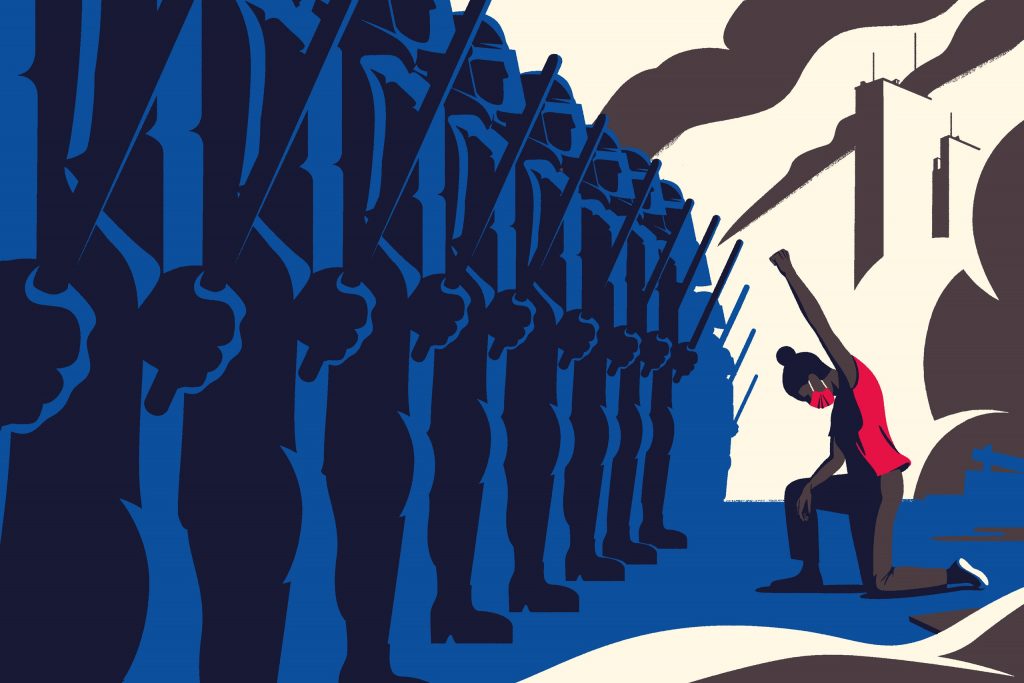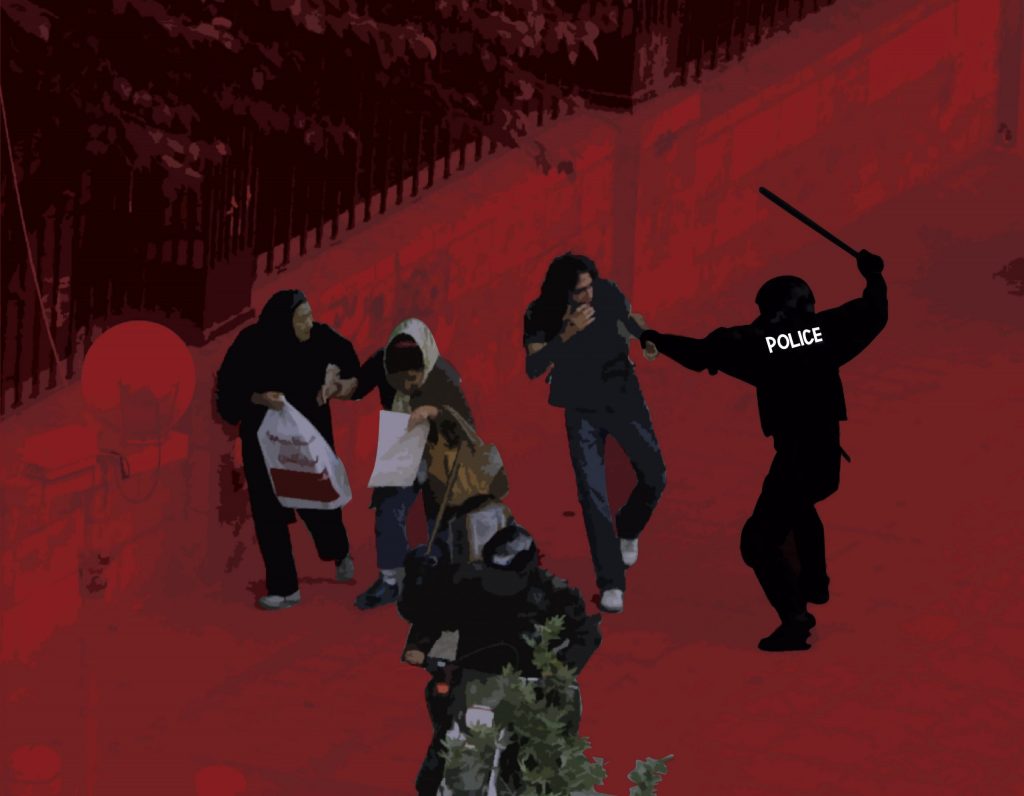
The police forces have always been an institution trusted to follow the legal system and help enforce it. They have traditionally created a sense of confidence in the citizens of the country, maintaining security and protecting everyone to the best of their abilities. However, recent instances have proved that this was an illusion, for the police brutality and the police encounters which shook the country recently make it hard to put our complete faith in the criminal justice system.
The issue first came to light with the encounter of the accused in the 2019 Hyderabad Rape case and its aftermath.
Encounter in the Hyderabad Rape Case
In the latter part of 2019, a 27-year old vet disappeared after attending a doctor’s appointment and her burnt body was found the next day. After investigations were held, it was discovered that she had been gang-raped before her body was incinerated. Four men were held to be accused in the subsequent case and, therefore, arrested by the police forces on the basis of the CCTV videos available.
However, on 6th December 2019, all of the four accused were killed in a police encounter when they were taken to a highway for the reconstruction of the crime scene ostensibly. The police officers alleged that two of the accused snatched their guns and tried to run away, prompting such action from them.
This incident brought mixed reactions from the entire country with some people criticizing the working of the Hyderabad police, but a majority of the population cheering the death of the accused in the case, regardless of the way in which that result came about.
However, judicial scrutiny of the police action was inevitable in a case such as this one. This can be deduced from the 2015 Supreme Court ruling in the People’s Union for Civil Liberties v. State of Maharashtra case where the Supreme Court made it ‘compulsory for a magistrate to investigate so-called encounter deaths to make sure that proper investigations into police encounters are carried out independently and efficiently‘.
Other recent events
This incident was followed by the recent encounter of Vikas Dubey in Kanpur, Uttar Pradesh. During an attempt to arrest the gangster, 8 policemen of the Kanpur Police Force were killed while 7 police personnel were injured. After being arrested by the police, the vehicle carrying Dubey overturned. He allegedly snatched a gun from one of the policemen and tried to run away, when he was killed by the police.
Again, it seemed that the actions of the police were praised by a few leaders and politicians and even the masses. However, the question regarding the working of the criminal justice system was raised, with people wanting an appropriate and fair enquiry to be held.
Police brutality goes beyond encounters though. Custodial violence, rape and torture have been reported many times. There have also been instances when the police stood silent and simply watched as mob lynchings happened, as happened in the Palghar mob lynching case. The Status of Policing in India Report 2019 by Common Cause and the Centre for the Study of Developing Societies revealed that majority of the cases related to police prejudice were against Muslims. It also distinctly observed that similar incidents were likely to happen to Adivasis, Dalits, transgenders and migrants from different parts of the country.
All these instances can lead to one observation – police forces misuse their powers to suit their ends instead of relying on proper judicial procedure.
Justification given in response
In all these instances, the police had provided half-hearted explanations as to what happened and why they acted in the way they did. But there were some unanswered doubts regarding their explanations, certain confusion as to the facts as reported by the police. They made use of the fact that there were no witnesses to the incident and therefore, without a detailed judicial inquiry, they could not be faulted with.

What is more worrying though is the support these actions, in specific the encounters of criminals, are gaining from the general public as well as from certain politicians and leaders. For instance, in the Priyanka Reddy rape case, Shesh Paul Vaid said, ‘Well done, boys’. BJP leader Kapil Mishra said that this was the way to deal with rapists. Baba Ramdev also put in his two cents and claimed that in heinous crimes such as rapes, all police officials should adopt this method of on the spot. In the aftermath of the Vikas Dubey encounter too, many people praised the actions of the Kanpur police and Uttar Pradesh Chief Minister Yogi Adityanath as well.
Consequences of unchecked Police Brutality
All these instances would have to be looked into in great detail by enquiries and investigations by reliable authorities. Only then would we be able to know the truth behind the matter and whether the situation was such that an encounter was the only option left with the police personnel.
It must be noted that criminal law does not allow killings by the police. The only exception available is that of self-defence. In both, the aforementioned encounters (the Priyanka Reddy case and the Vikas Dubey fiasco) the police had reported a situation where the alleged accused snatched guns from the policemen and tried to flee the scene. Therefore, it does give the policemen an ostensible right to self-defence.
The aftermath of these incidents will not be rosy for the country as a whole. The fact that police officers can commit such offences in the name of law enforcement, compels one to think of the place the law enforcement system occupies in the process of obtaining justice. No matter what crime the person has committed, it is only the courts which are authorized to punish the person in question. Just because the result would not be as quick and efficient as an “on the spot” encounter, does not mean that the courts themselves should never be approached in the first place or that they have no use.

By not taking immediate action against the police officers and carrying out fair and unbiased investigations, a precedent is being set for the masses. These cases can be used to justify similar situations in the future when the crime committed is heinous and people take the law into their own hands to give out ‘appropriate’ punishments, as they see fit. This type of vigilante justice will then be seen as a replacement of the typical court procedure followed.
The objective of the criminal system is not to promote revenge but to provide a properly regulated procedure through which such offences can be dealt with appropriately. But the actions of these police officers may convey the exact opposite to the public who would not resist seeking revenge and therefore justice for themselves, by themselves.
Suggestions and Conclusions – Curbing Police Brutality
The first and foremost step is to conduct thorough enquiries and proper investigations of these recent incidents and see whether the reports submitted by the personnel are indeed true or not. If not, prompt action must be taken against police brutality so as to set a precedent for other police officers and the general public as well.
It is quite evident that the courts and the procedures they follow do not make for the most efficient system of disposal of cases and dispensing of justice. This is especially so in cases involving heinous offences. However, it must be noted that changes are regularly being brought about to speed up the process and make it more efficient. The mere fact that it may take a bit longer for justice to be obtained should not prompt people to adopt rather impulsive and unlawful means.
Keeping in mind the consequences these actions have on the general public, the courts should focus on quickening the process and coming out with a decision as soon as possible. This would dissuade the police officers from taking law in their own hands and would help curb police brutality.
All these instances have considerably reduced the faith people place in the criminal justice system and led them to wonder about the effectiveness of the judicial system. Vigilante justice seems to be a quick and effective alternative to it. The very fact that no prompt action has been taken against the officers only serves to promote such thinking. With even political leaders outright praising such actions, it is no wonder that people are opening up to the idea of vigilante justice more and more.
The judges and courts need to take urgent action to deal with these problems. Only when the people see some decisive judgments and regulations will their faith be restored in the justice system. The legal system is an important part of the working of our country, but it only when the people responsible for it are fearless and unbiased, will it be able to regain its position of prestige in the eyes of the citizens of India.
Editor’s Note –
The prevalence and acceptance of the practice of extrajudicial killings are deeply entrenched into the system, and the current provisions of the law are evidently not strong enough to root them out completely. With so much overlap between the ones conducting the investigations and the ones being investigated, the likelihood of impartiality being compromised is extremely high.
These provisions need to be strengthened and executed more judiciously for a short term solution. And as for a long term solution, there is a requirement for the entire criminal justice system to be overhauled and rebuilt from the ground up. New police reforms must be brought into the picture in order to protect its independence by divorcing the system from political influences. Such examples of police brutality are a manifestation of the illegitimate use of power by the establishment. For the State to reclaim its moral high ground, the establishment has to be purged of such delinquencies.
Submitted by Garima Chauhan.